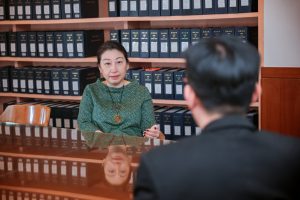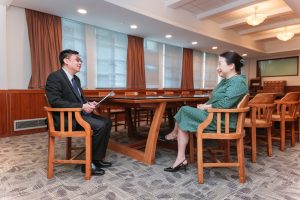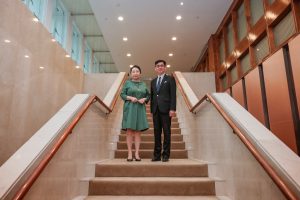In the alternative dispute resolution arena, mediation plays a prominent role in resolving disputes in all scales globally. Hong Kong is a mediation hub in the region and one would be interested to see what Hong Kong is offering and what it will offer to the development of mediation. To share with us how mediation is being widely used and promoted both locally and internationally through Government initiatives, I have the pleasure to talk to Ms. Teresa Cheng, SC, the Secretary for Justice of the Hong Kong Special Administrative Region Government.
Ms. Teresa Cheng, SC, was appointed Secretary for Justice on January 6, 2018. She is a woman of many talents, from being a Senior Counsel, to chartered engineer and chartered arbitrator handling complex international commercial or investment disputes.
I am impressed by the fact that Ms. Cheng was the first Asian woman elected through a global election as President of the Chartered Institute of Arbitrators and the first woman to deliver the Alexander Lecture. She is also a member of the International Centre for Settlement of Investment Disputes Panel of Arbitrators, and was a member of the World Bank’s Sanctions Board. With a strong background in arbitration, Ms. Cheng also sees the benefit of mediation in resolving conflicts, particularly in investor-State dispute settlement.

TK: Shall we start by introducing us the work of the Department of Justice in respect of dispute resolution, particularly those touching on the promotion of mediation as a means of dispute resolution?
SJ: Some of you may know that our Department has a Mediation Team dedicated to implement our long term policy to promote and develop mediation in Hong Kong. The Team is responsible for implementing major initiatives in the promotion and development of mediation services in Hong Kong, for example, holding various promotional activities, conferences and training courses which we may talk about more later if we have the opportunity to do so. The Team also provides secretariat and research support to the Steering Committee on Mediation and it sub-committees, which advise on the promotion and development of mediation in Hong Kong.
Our Mediation Team has also been tasked to take forward the work required to sustain the further development of Hong Kong’s mediation services for resolution of domestic and international disputes as well as the promotion of wider use of mediation in the Greater Bay Area. This will complement the efforts of the Department in promoting Hong Kong as an international legal and dispute resolution services centre in the Asia Pacific region.
In January 2019, the Inclusive Dispute Avoidance and Resolution Office (“IDAR Office”) was established to better co-ordinate and implement, under my direct steer, initiatives that the Department undertakes in the areas of dispute avoidance and resolution. The IDAR Office pursues and concludes co-operation or partnership arrangements with other jurisdictions and international organisations. It also organises, supports or encourages important international events and activities to take place in Hong Kong, as well as raise the international profile of Hong Kong in deal making and dispute resolution through capacity building and promotional activities overseas. The Mediation Team is one of the teams that provides support to the IDAR Office.
Recently, we have set up a Rule of Law Unit under the IDAR Office for the 10-year initiative “Vision 2030 for Rule of Law”. Through professional exchanges, research and capacity building with stakeholders including youths, legal practitioners, and academics, etc., it is hoped that this 10-year initiative “Vision 2030 for Rule of Law” can strengthen Hong Kong community’s understanding of the concept of the rule of law and its implementation, enhance development of the rule of law internationally and safeguard Hong Kong’s prosperity, stability, and sustainable development.

TK: I am particularly interested in DoJ’s initiatives on promotion of mediation and other dispute resolution means. I am sure that there are going to be quite a number of activities in the latter half of 2020 to promote the use of mediation in different aspects. Can you tell us more about these events and how mediators and interested parties, particularly those coming from overseas, can benefit from these activities?
SJ: The Legal Hub website (http://www.legalhub.gov.hk) has all the details of deal-making and dispute resolution services related events. I will therefore mention some of the important events here.
The Department will officially launch its 10-year project entitled “Vision 2030 for Rule of Law” later this year. Through this initiative, we hope to promote the proper understanding and recognition of the rule of law by studying its various elements through research, stakeholders’ collaboration and capacity building, thereby contributing to the sustainable development of inclusive and fair societies at both the domestic and international levels. The Inaugural Rule of Law Congress will mark the start of this year’s Legal Week on 2 November 2020, followed by an array of conferences and seminars with international and locally renowned speakers sharing insights on legal and dispute resolution issues.
One of the highlights of the Legal Week will be the Mediation Conference, to be held on 6 November 2020. We have been orgainising this biennial event since the first Mediation Conference in 2007. This year, distinguished international and local speakers will be invited to discuss various topics on mediation including sports mediation, the United Nations’ Mediation Convention as well as investor-State mediation.
Another important event will be the United Nations Commission on International Trade Law (“UNCITRAL”) Working Group III Intersession Meeting. Since 2017, the Working Group III has been developing reform options for investor-State dispute settlement (“ISDS”). The greater use of investment mediation has received much support in Working Group III. To push forward the development of investment mediation as an option for ISDS reform, the People’s Republic of China will host an intersessional meeting on 9 and 10 November in the Hong Kong Special Administrative Region, making it the first time for a Working Group of UNCITRAL to meet in the city and probably the first time for an intersessional meeting of Working Group III to adopt a hybrid mode of organization with both online and physical arrangement, in light of the COVID-19 pandemic.
The intersessional meeting will be attended by representatives from the 60 member States of UNCITRAL, observer States and organizations, representatives from international organizations and leading experts and academic in the field of ISDS. On the first day of the intersessional meeting, which will be an expert panel conference that is open to the public, innovative issues on investment mediation are going to be discussed, and international mediators are most welcome to join in to share their insights and exchange views with the delegations to facilitate the international rule-making by States in respect of investment mediation.
Speaking of ISDS, we will continue to organise the Investment Law and Investor-State Mediator Training with the International Centre for Settlement of Investment Disputes (“ICSID”) and Asia Academy of International Law (“AAIL”), being the third time this year. We are very encouraged by the overwhelming positive feedbacks from participants of the last two training courses in 2018 and 2019. Local and overseas stakeholders, government officials, lawyers and mediators are most welcome to attend the coming training course to benefit from the world class trainers.
The outbreak of COVID-19 has posed significant challenges globally and we expect that there would likely be an upsurge of disputes arising from or relating to COVID-19. One of the measures recently-announced by the Government, which will be of particular relevance to the dispute resolution sector, is the COVID-19 Online Dispute Resolution (“ODR”) Scheme which was launched on 29 June 2020. The Scheme aims to provide speedy and cost-effective means, including using mediation, to resolve such disputes globally and locally, especially for those involving micro, small and medium-sized enterprises (“MSMEs”) that may be adversely affected or hard hit by the pandemic. eBRAM will provide ODR services under the Scheme to the general public and businesses, in particular MSMEs, involved in disputes of value not exceeding $500,000 at a very low fee. More details of the Scheme can be found at https://www.ebram.org/covid_19_odr.html.
TK: I heard that DoJ has set up a Legal Hub in Hong Kong. Can you tell us more about it and the reasons for setting it up?
Pursuant to the policy objective of enhancing Hong Kong’s status as an international legal and dispute resolution centre in the Asia Pacific region, the Government has committed to provide certain space in the West Wing of the former Central Government Offices (CGO) and the former French Mission Building to law-related organisations (LROs). Together with the DoJ’s offices in the Main Wing, East Wing and part of the West Wing of the former CGO, the area is intended to form a Legal Hub at the heart of Hong Kong.
The LROs which have confirmed acceptance of the offer of space in the Legal Hub cover a good mix of reputable local, regional and international organisations specialising in different legal or dispute resolution services or functions, thereby reflecting Hong Kong’s status as an ideal hub for deal-making and dispute resolution.
The Legal Hub will help attract talented people with a global outlook in the legal and dispute resolution sector to Hong Kong, and to provide a premier platform for dispute resolution and business expansion in Asia.
TK: Hong Kong as a leading international dispute resolution centre will want to attract more people to come here to conduct mediation, as well as other modes of alternative dispute resolution. In your opinion, what is the attractiveness of Hong Kong that draws international mediators to practise in Hong Kong?
Hong Kong has a sound legal infrastructure in mediation. On the regulatory side, we have in place the Mediation Ordinance to facilitate the wider use of mediation by protecting the confidential nature of mediation communications. Hong Kong is the first jurisdiction in Asia to enact the Apology Ordinance to promote and encourage the making of apologies with a view to preventing the escalation of disputes and facilitating their amicable resolution. In addition, the Judiciary is a strong supporter of mediation. They recognize that mediation is one of the common modes of alternative dispute resolution and a cost-effective means of resolving disputes. To this end, the Judiciary has issued Practice Directions which strongly encourage parties to mediate their disputes before resorting to litigation. It has also set up the “Integrated Mediation Office” to assist the parties to understand the nature of mediation and how it will help the litigants resolve their disputes.
In respect of accreditation, we have the Hong Kong Mediation Accreditation Association Limited (“HKMAAL”), which is a single body for accreditation of mediators in Hong Kong. Nonetheless, Hong Kong welcomes mediators from other jurisdictions to practise mediation here as accreditation by HKMAAL is not a mandatory requirement.
You will also note that Hong Kong offers vast opportunities for both local and overseas mediators to practise mediation, e.g. an investment mediation mechanism has been adopted under the Mainland and Hong Kong Closer Economic Partnership Arrangement (CEPA) Investment Agreement to help resolve investment disputes between investors and the Mainland or Hong Kong authorities or institutions. With the CEPA investment mediation mechanism in place, we have helped to build up a team of investment mediators in Asia. As mentioned earlier, we offer the Investment Law and Investor-State Mediator Training Courses co-organised with ICSID and AAIL.
TK: What words of wisdom would you offer to young mediators?
I would like to share with them the four “I”s – inclusive, informative, innovative and interactive – which were the theme of the inaugural Hong Kong Legal Week in November last year.
Inclusive: Mediators, by their nature, practice inclusiveness in their daily life and work. They are always able to accommodate and respect views and ideas from different background, tradition and culture.
Informative: Mediators must be well-equipped with mediation skills. They should also be well-informed as to the types of business or conflict that they have to handle.
Innovative: The ability to analyse the problem from different perspectives and think out of the box to come up with a creative solution so as to accommodate the interests of different parties is crucial to a successful mediation.
Interactive: Mastering effective communication skills is the key to moving towards mutual understanding. Active listening is conducive to understanding the nature of conflict, thereby helping disputing parties to reach an agreement. Encouraging each party to voice their concerns and opinions in a fair manner so as to bridge the gap will help achieve a win-win solution.
The second Hong Kong Legal Week will be held in November with a wide range of capacity building programmes. You will be able to find more updates here (http://www.legalhub.gov.hk).
TK: Thank you Secretary for Justice. It’s such an honour sitting down with you to chat about mediation and related issues out of your busy schedule. We appreciate it.

________________________
To make sure you do not miss out on regular updates from the Kluwer Mediation Blog, please subscribe here.


